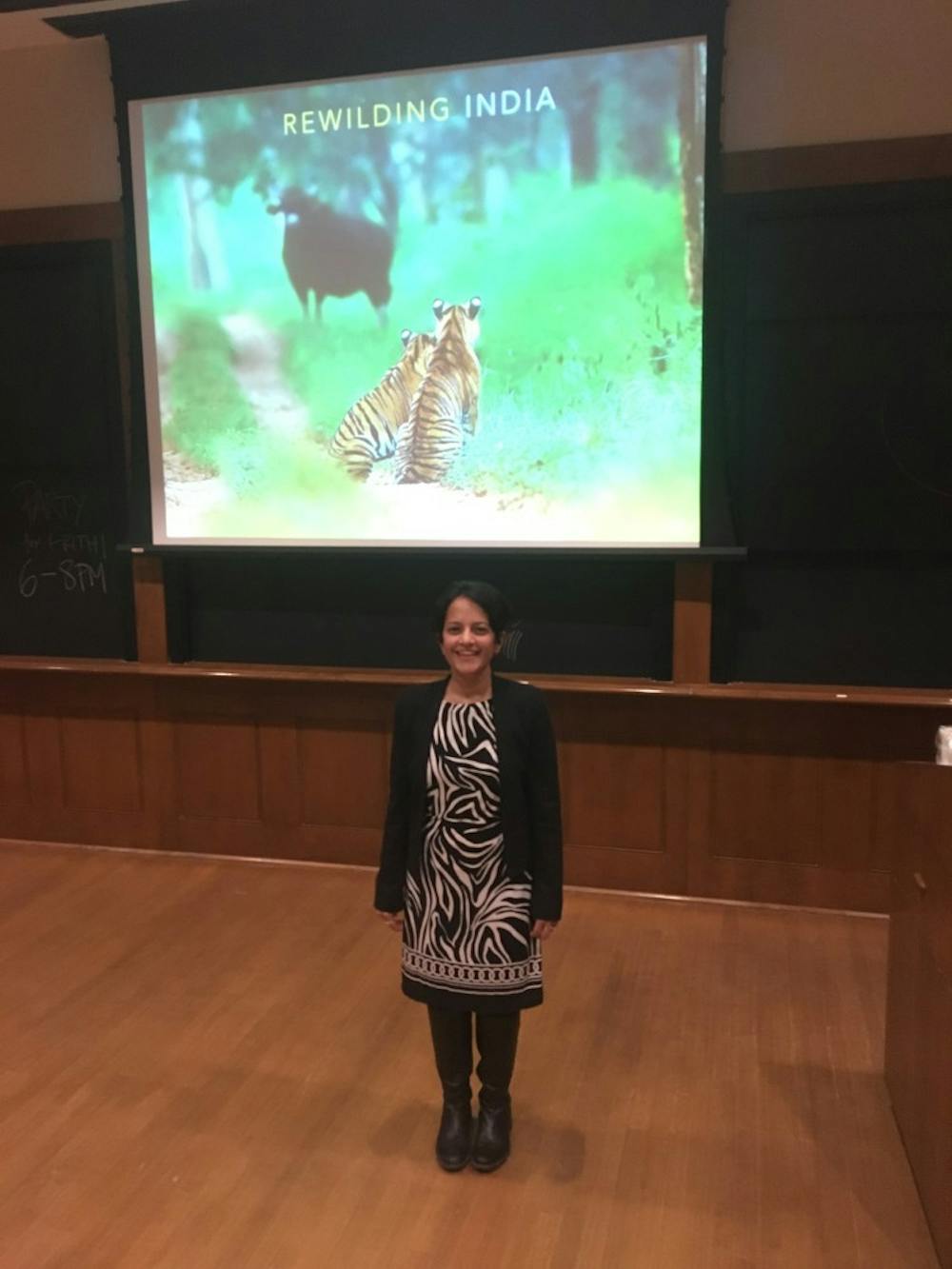Often, one of the biggest challenges conservationists face is the conflict between local communities and the surrounding wildlife — especially in a country with a billion people. Conservation biologist Krithi Karanth, explaining her work at a lecture Monday, has devoted her life to addressing this problem in India.
“I got a first-hand view of how amazing it is to watch animals and be outside in nature," Karanth said. She explained that her childhood experiences with wildlife and wildlife reserves inspired her work today.
“I had a very unusual childhood," Karanth said. "My dad was a wildlife biologist and he started taking me to the jungle when I was a year old.”
Karanth explained how she would spend hours with her father watching wildlife from his Jeep while studying. Karanth also said that she learned patience and witnessed the uglier sides of conservation. For example, Karanth explained how an angry group of local people destroyed a research facility in response to a poacher's arrest. This confrontation, she said, is an example of how conservation affects local communities. Initially, the confrontation actually deterred Karanth from conservation work. Luckily, Karanth said, she eventually returned to the cause.
Now, her work is devoted to providing safe habitats for animals. After doing research, Karanth saw shockingly uneven facts. First, in locations such as Madagascar, Papua New Guinea, and India, less than 3 to 5 percent of land is set aside for animal life.
“Our battle to save nature is on the front lines in places like this," she said.
Karanth talked about how her colleagues working in the Amazon and in the African continent have the luxury of fighting for 10 to 15 thousand square kilometers of land for the animals. Karanth was fighting for merely hundreds of square kilometers in the areas in which she worked, mainly in India.
“What’s interesting is those areas we do have [in India] are very fragmented, very distant, and still are holding 70 percent of the world’s tigers, 50 percent of the world’s elephants, and a whole lot of other species," she noted .
Karanth’s work often deals with conflict between humans and wildlife. Specifically, Karanth said her main opponent to animal conservation is frequently to the desire communities have to retaliate against animals destroying their crops and housing and even occasionally injuring and killing humans.
According to Karanth, there are 81,100 incidents of animals harming humans or otherwise interfering with humans’ lives reported in India. Karanth said that this number accounts for only 30 percent of the actual number of incidents in India. What’s more, only 5.3 million dollars are allocated for compensating those individuals who fall victim to these incidents, she said.
Karanth cited the overwhelming amount of bureaucracy and paperwork as the main cause of a reluctance to report incidents and thus a desire on the part of communities to take matters into their own hands. As a result, Karanth has set in place a variety of measures to calm the people down and lessen their hurt and anger.
Karanth combats this issue mainly through a program of her creation called Wild Seve. On behalf of affected communities, the program will respond to incident reports and file the necessary paperwork for compensation in an effort to increase report percentages and decrease the number of personal retaliations. When asked about the efficacy of this program, Karanth explained that all anecdotal evidence has pointed to the organization's success. People reporting incidents now frequently refuse to make any decisions without having consulted Wild Seve first, she said.

Karanth also mentioned a program in which she helps relocate willing families in an effort to establish wildlife reserves. The program has helped over 1,500 families resettle and acclimate to a new community, she said. She emphasizes, however, that conservation efforts should not negatively impact humans for the sake of animals, but instead make the situation advantageous for both parties.
“Going forward, the challenge is fostering tolerance and sustaining wildlife," she said.
Karanth's lecture, titled “Conserving Wildlife Amidst a Billion People: Challenges and Solutions," took place at 4:30 p.m. in 10 Guyot Hall as part of the EEB 522 seminar series.









